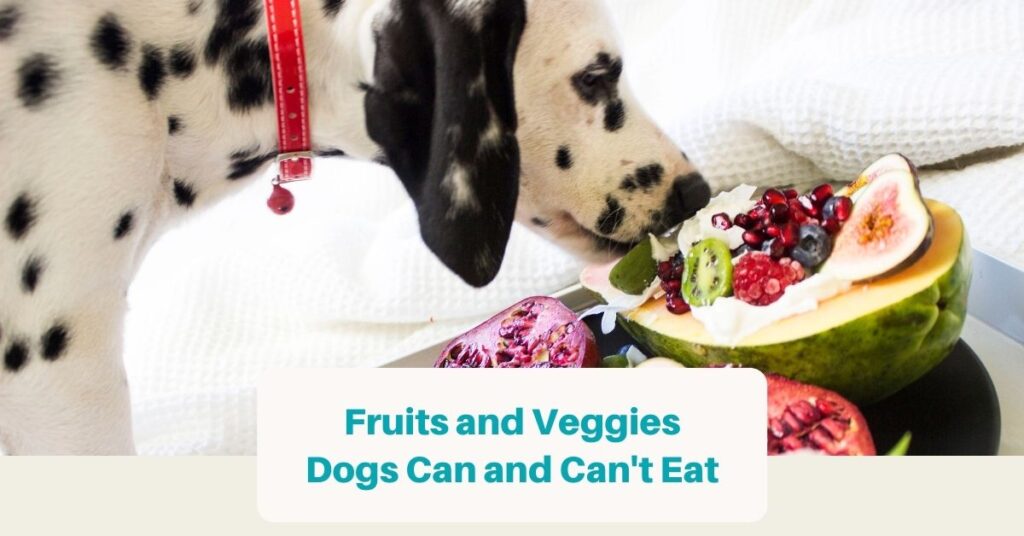
Here is a list of 33 fruits and vegetables that your dog can and can’t eat.
My name is Mikail Khan, and I have spent tens of hours gathering data on what fruits and vegetables are safe for your dog.
So, you can have one ultimate guide on what fruits and veggies to feed your dog.
Here’s what you will learn…
1) What Fruits Can Dogs Eat
2) Fruits Dogs Can’t Eat
3) Vegetables Dogs Can Eat
4) Vegetables Dogs Can’t Eat
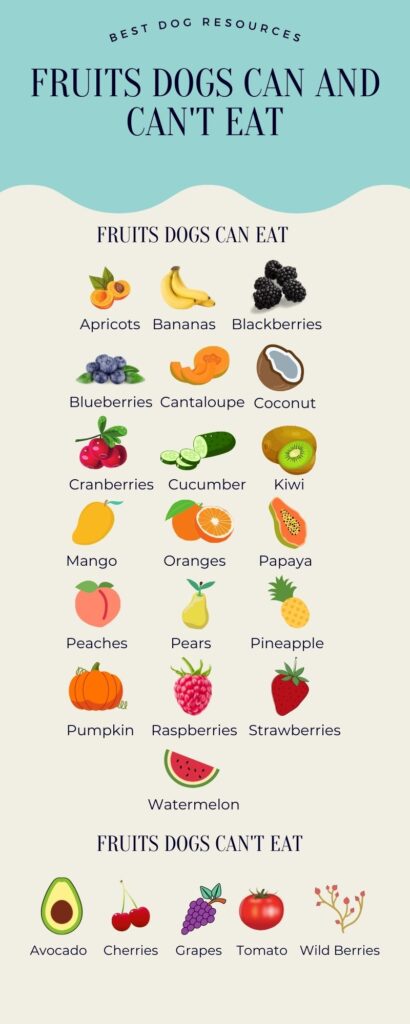
If you’re interested in learning about which foods are safe for your dog… keep reading…
Table of Contents
ToggleWhat Fruits Can Dogs Eat

Below we will discuss the fruits that are safe for your dogs.
Apricots
Can Dogs Eat Apricots? Yes, Apricots are safe for dogs.
Benefits: Contains vitamins A and C, potassium, copper, fiber, and beta carotene
You can give apricots to your dog, but before offering them to your dog, you must ensure to remove the pit. The pit is toxic to dogs as it contains traces of cyanide which can cause cyanide poisoning if consumed in a large amount. The pits can also cause a blockage in the intestine.
Bananas
Can Dogs Eat Bananas? Yes, dogs can eat bananas.
Benefits: Bananas are high in potassium, fiber, vitamins B6 and C, copper, and biotin.
Bananas are an excellent treat for your dog as it contains low cholesterol and sodium. But, because of its high sugar content, you should give it in moderation. Also, peel it before giving it to your dog, as the bananas peels can cause intestinal blockage.
Blackberries
Can Dogs Eat Blackberries? Yes, dogs can eat blackberries in moderation.
Benefits: Blackberries contain vitamin C, A, and K, omega-3 fatty acids, fiber, and antioxidants.
Blackberries contain antioxidants that fight the free radicals that cause oxidative damage to cells, contain anti-microbial properties, and support cognitive function as your dog ages. But, blackberries contain small amounts of xylitol which is toxic to dogs. So, for this reason, you should give blackberries in small quantities. Generally, two to three blackberries a day would be fine for a small dog.
Blueberries
Can Dogs Eat Blueberries? Yes, dogs can eat blueberries.
Benefits: Blueberries contain vitamin C, antioxidants, fiber, and phytochemicals
Blueberries are good low-calorie treats for dogs as it improves night vision, helps prevent oxidative damage to cells, and improve brain function in aging dogs. You can treat your dog with 8-10 blueberries per day, depending on the size of your dog.
Cantaloupe
Can Dogs Eat Cantaloupe? Yes, dogs can eat cantaloupe.
Benefits: Great source of water and fiber
Cantaloupe is low in calories and contains healthy nutrients. Your dog will love it as a treat and gain some great health benefits.
Coconut
Can Dogs Eat Coconut? Yes, dogs can have coconut meat and oil in moderation.
Benefits: Coconut contains powerful anti-inflammatory properties
Both coconut meat and oil are great for dogs. It can help with many conditions such as skin allergies, inflammatory bowel disease (IBD), and arthritis. But, you should give coconut in moderation as it contains medium-chain triglycerides, which can cause some gastrointestinal upset and bloating. And, you may altogether avoid it in case your dog has a sensitive stomach.
Cranberries
Can Dogs Eat Cranberries? Yes, dogs can eat cranberries in moderation.
Benefits: Cranberries contain vitamin C, E, and K, fiber, potassium, and antioxidants
Cranberries can be an excellent superfood for your dog because of their antioxidants and nutrient content. You can feed your dog both fresh and dried cranberries. Though dried cranberries should not contain added sugars, read the label first. The downside of cranberries is that they are very acidic, so they should be offered in moderate amounts only. In addition, too many cranberries can lead to stomach upset, diarrhea, or vomiting.
Cucumber
Can Dogs Eat Cucumber? Yes, dogs can eat cucumber.
Benefits: Low in salt, sugar, and fat
Cucumbers are safe for your dog to eat in moderation. They are great for overweight dogs as cucumbers hold low calories. Fresh cucumbers can significantly boost the energy levels of your dog.
Kiwi
Can Dogs Eat Kiwi? Yes, dogs can eat kiwi.
Benefits: Kiwi is loaded with more vitamin C than an orange
Kiwi provides an abundance of nutritional benefits to dogs. It is good for the digestive system and the skin. You need to remove the skin and seeds before giving them to your dog.
Mango
Can Dogs Eat Mango? Yes, dogs can eat mango in moderation.
Benefits: Mangos contain fiber, proteins, minerals, antioxidants, and vitamins B, B6, C, and E.
Mango can be a great yummy treat for your dog. Mango contains nutrients that can influence a dog’s reproduction, growth, skin, and coat. Mango can also help a dog with an upset tummy. However, remember to remove the pit before giving the mango to your dog, as it contains cyanide. And you should provide mango in small amounts due to its high sugar content.
Oranges
Can Dogs Eat Oranges? Yes, dogs can eat oranges.
Benefits: Excellent source of vitamin C, potassium, and fiber
Oranges can be a great tasty treat for your dog. But, not every dog may like the strong-smelling citrus. If your dog doesn’t like the citrus, don’t force him to eat it.
Papaya
Can Dogs Eat Papaya? Yes, dogs can eat papaya.
Benefits: Good source of fiber, vitamins A, C, and K.
Papayas can be an exotic treat for your dog. The flesh of papaya can make it an excellent snack. But, remember to remove the seeds before giving the papaya to your dog. The seeds can cause intestinal blockage and contain traces of cyanide.
Peaches
Can Dogs Eat Peaches? Yes, it’s safe to feed your dog peaches in small amounts.
Benefits: Source of fiber and vitamin A.
Peaches are an excellent fruit for your dog to eat, in moderation, as long as you remove the pit. Because the pit contains cyanide. You should give fresh peaches to your dog and skip canned peaches as they have high amounts of sugar syrups.
Pears
Can Dogs Eat Pears? Yes, dogs can eat pears in moderation.
Benefits: High in copper, vitamins C and K, and fiber.
Pears are safe for dogs, but this doesn’t mean you should give a lot of pears to your dog regularly. Hence, one slice of pear now and then will be fine. However, first cut the pear into bite-size chunks and remove the pit and seeds to avoid choking hazards.
Pineapple
Can Dogs Eat Pineapple? Yes, dogs can eat pineapple.
Benefits: Pineapple is jampacked with hydration properties, vitamins C and B6, antioxidants, minerals, and bromelain.
Pineapples have 82% water content. So, it can be a refreshing snack for your dog in hot summer. Pineapples also help repair damaged cells, boost dog immunity, and support healthy skin and coat. Make sure to remove the prickly outside peel and crown before giving it to your dog.
Pumpkin
Can Dogs Eat Pumpkin? Yes, pumpkins are safe for your dog.
Benefits: Contains vitamins A, C, and E, iron, potassium, and fiber.
You can feed pumpkins to your dog to boost their nutrition. Pumpkin is also excellent for digestion due to its high fiber content. Pumpkin supplements and pumpkin dog treats are also available in the market. But make sure not to feed your dog pumpkin pie mix.
Raspberries
Can Dogs Eat Raspberries? Yes, Raspberries are safe for your dog in moderation.
Benefits: It contains vitamins, fiber, antioxidants, and minerals.
Raspberries contain anti-inflammatory properties, which can help aging joints in senior dogs. Again, though, it would be best to give raspberries in moderation to your dog because it contains small amounts of xylitol.
Strawberries
Can Dogs Eat Strawberries? Yes, dogs can eat strawberries.
Benefits: Good source of potassium, fiber, vitamin C, and antioxidants.
Strawberries are good for your dog’s immune system. Also, strawberries contain an enzyme that can whiten your dog’s teeth. However, you should give strawberries in moderation due to their high sugar content.
Watermelon
Can Dogs Eat Watermelon? Yes, you can give watermelon to your dog.
Benefits: Watermelon contains excellent hydration properties and healthy vitamins.
Watermelon can be an excellent treat for your dog in summer because watermelon is 92% water. But, make sure to remove the seeds and rinds before giving them to your dog, as the seeds can cause choking or intestinal blockage.
Fruits Dogs Can’t Eat
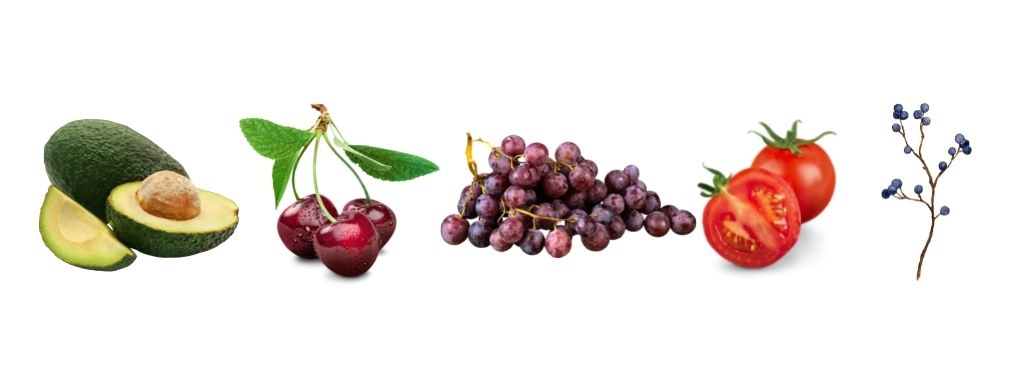
Above, we have discussed what fruits your dog can eat, but now we will discuss what fruits you should avoid giving to your dog.
Avocado
Can Dogs Eat Avocados? No, don’t feed avocado to your dog.
Avocados’ high-fat content can cause pancreatitis or stomach upset in some dogs. Avocado’s skin, pit, and leaves also contain persin, which is toxic to dogs and can cause vomiting and diarrhea in dogs. The pit can also cause intestinal blockage. So, it is better to avoid avocado altogether to be on the safe side.
Cherries
Can Dogs Eat Cherries? No, don’t feed cherries to your dog.
You don’t want to feed your dog cherries because cherries’ pits, stems, and leaves contain cyanide. Cyanide can be lethal to dogs if consumed in large quantities. Cyanide disrupts cellular oxygen transport, meaning your dog’s blood cells can’t get enough oxygen. Avoid giving cherries to your dog.
Grapes
Can Dogs Eat Grapes? No, grapes are toxic to dogs.
Grapes and raisins are toxic to dogs no matter the dog’s breed, sex, or age. Unfortunately, a tiny amount of grapes can be lethal to the dog. Grapes could potentially lead to acute (sudden) kidney failure in dogs. Some symptoms of grapes ingestion could include loss of appetite, lethargy, vomiting/diarrhea, and abdominal pain. Call your vet immediately if your dog has got his hands on some grapes.
Tomatoes
Can Dogs Eat Tomatoes? No, don’t feed tomatoes to your dog.
Tomatoes themselves are not toxic to dogs but can cause stomach upset if consumed too much. On the other hand, the tomatoes plant can be harmful to dogs if eaten and cause gastrointestinal (GI) upset. Therefore, it’s better to skip tomatoes altogether just for safety.
Wild Berries
Can Dogs Eat Wild Berries? No, don’t feed wild berries to your dog.
Many wild berries are toxic to dogs, so it’s better not to feed your dog wild berries.
Vegetable Dogs Can Eat
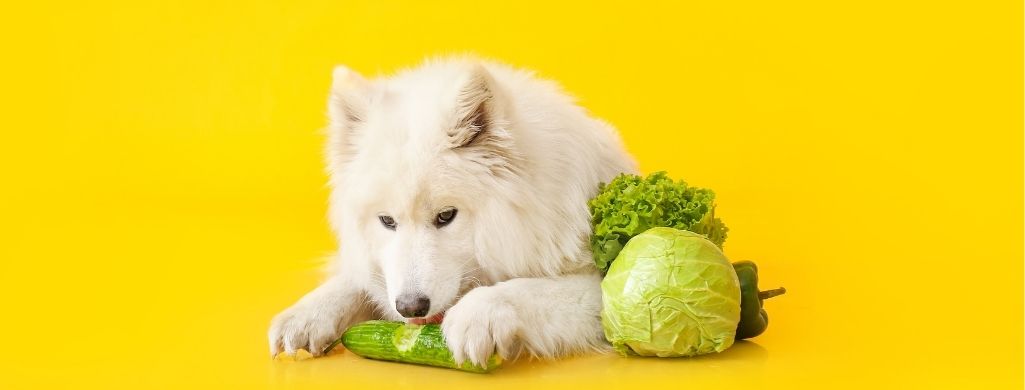
We will be discussing below the different types of vegetables that your dog can eat.
Asparagus
Can Dogs Eat Asparagus? Asparagus is safe for your dog.
Benefits: No apparent benefits.
Asparagus is safe for your dog, but there is no point in giving it to your dog. Dogs can’t eat asparagus raw, and it loses all its good nutrients when you cook it.
Broccoli
Can Dogs Eat Broccoli? Yes, dogs can eat broccoli as an occasional treat.
Benefits: Source of fiber, vitamins K, and C, minerals, and folic acid.
Yes, cooked broccoli is safe for dogs. Broccoli can be great for your dog’s digestive system due to its high fiber content. But remember to cut the broccoli into bite-size pieces to avoid choking hazards or intestinal blockage before feeding it to your dog. Also, just like any other treat, you should give broccoli in moderation occasionally.
Brussels Sprouts
Can Dogs Eat Brussels Sprouts? Yes, dogs can eat brussels sprouts.
Benefits: Source of healthy nutrients and antioxidants.
Brussels sprouts can be a tasty meal for your dog as long as you give plain, fresh, and cooked brussels sprouts. In addition, Brussels sprouts can be beneficial for overweight and diabetic dogs.
Carrots
Can Dogs Eat Carrots? Yes, you can feed carrots to your dog.
Benefits: High in fiber and beta-carotene.
Your dog can enjoy carrots safely. Carrots are included in many dog foods, and it’s best for your dog’s teeth. Also, crunching on a carrot can be fun for your dog.
Other Vegetables That are Safe for Dogs
Your dog can also enjoy these vegetables safely:
- Green Beans
- Peas
- Spinach
Vegetable Dogs Can’t Eat
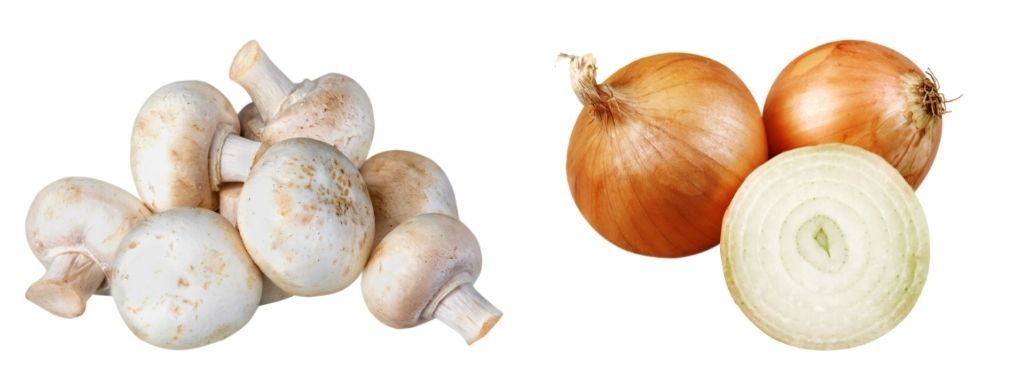
Finally, it’s time to discuss which vegetables can be harmful to your dog.
Mushrooms
Can Dogs Eat Mushrooms? No, don’t feed mushrooms to your dog.
There are only 50-100 out of 50,000 mushrooms species worldwide that are not toxic. Mushrooms can be easily misidentified, especially mushrooms found in the wild. Poisonous mushrooms can be very lethal to your dog and can lead to death. So it is better to avoid mushrooms altogether. If your dog gets his hands-on mushrooms in the wild, immediately call your vet.
Onions
Can Dogs Eat Onions? No, don’t feed onions to your dog.
Onions can cause red blood cells to rupture and cause vomiting, diarrhea, nausea, and stomach pain if your dogs eat them. Japanese breeds such as Akitas and Shiba Inus are more prone to poisoning from onions. But, it is recommended to avoid giving onions to any dog.
The Bottom Line
The list above is about what fruits and veggies are safe for your dog. These foods should be given in moderation and occasionally as a healthy treat. However, it should by no means replace a certified balanced diet. If you’re in doubt about any food, then contact your trusted veterinarian for more information.
Relevant Articles:




